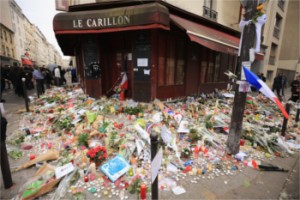
Memorial offerings outside the Le Carillon restaurant, one of the scenes of last Friday’s attacks. Photo: Christopher Furlong/Getty Images
For OPC members with close ties to Paris, attacks that killed more than 120 people on Friday struck a personal chord. We have collected thoughts from club members who live or have lived in Paris.
Vivienne Walt is a foreign correspondent currently based in Paris, and a contributor to Time and Fortune magazines.
“There has been a sense all year that Paris would face more attacks – almost a feeling of inevitability. But still, all seemed so unreal when the first gunfire erupted on Friday night. Surely this was some gang fight? Sadly, no. It was, in fact, worse than anyone could have imagined. At times like this we correspondents dive headlong first – and this was no different. I’ve spent days outside the Bataclan and the attacked restaurants, at counseling centers with grieving relatives, and at Paris’s morgue, and have written seven stories in three days, plus conducted numerous interviews on air with TV anchors who’d dropped into Paris from New York and Washington.
“Just like with the Charlie Hebdo attacks, we are both journalists and locals in this story. Sometimes, it is easy to forget, in the rush of reporting, that the ‘local’ side of things needs careful consideration too. So, it was not surprising that it took me two full days to sit down with my son, 9, and hear his thoughts. He wanted answers: “Why did they do it? Why those restaurants and not other restaurants?” Those are hard to answer. And meanwhile, we have other difficult questions: When did ISIS start plotting this? How did Europe miss the plans? How come the attackers were not in jail, if French police knew about them? It’ll take a lot more stories in the weeks and months ahead to unravel all these threads.”
OPC Foundation scholar Makini Brice has reported from France, and received a joint M.A. in French Studies and Journalism from New York University. Brice won this year’s OPC Foundation’s Flora Lewis fellowship, which has been extended in the Reuters bureau in Dakar.
“Hours after word had spread about a terrorist attack in Paris that had added it (once again) to a long list of devastated sister cities, I received a message from a friend, who probably knew Paris more intimately than I had, who I had once shared an apartment in the tenth arrondissement: “It’s by the fruit man on St. Maur.”
“That was when it began to feel real.
“This was not an attack at a media or financial or political institution, my friend pointed out. It was an attack at the very heart of France, on the young, on the diverse, on the progressive, on the people who had lived the very ideals that France proclaims – freedom, brotherhood, equality – rather than symbols of the failings or trappings of those very notions.
“Terrorist attacks like the ones in Paris do not gain their potency from the people who were killed, but rather the attack on the collective psyche. It is the understanding that it could have been you, your friends, your loved ones who could have been sitting on a terrace by the Bataclan or outside a stadium’s friendly match. It is the knowledge that a war occurring hundreds or thousands of miles away could spill over to your shores, and that just because it was Paris that was victimized this time, your city could be next. But then, in this age of globalization where it seems it is as easy to export violence as it is to ship money, goods and services, that was always true.”
OPC Board of Governors member Jacqueline Albert-Simon is U.S. Bureau Chief and Associate Editor of Politique Internationale and has spent three decades reporting and analyzing U.S. foreign policy for French and other European readers. She is a resident fellow at The Institute of French Studies at New York University.
Francois Hollande: France’s new Napoleon or George W. Bush?
“Francois Hollande’s declaration of war has a historic ring. It’s not only his decisive statement but his demand for NATO’s coordinated reaction that’s significant. Ultimately, the hope is that the collective mind and imagination as well as military power can destroy ISIS. Hollande has been a relatively mediocre president. But now that he is suddenly a hero and a world leader, his place in history assured. As always, the French are predictably unpredictable.”
